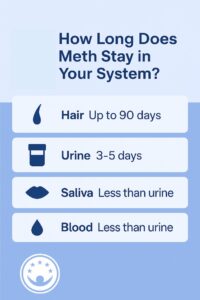How Long Does Meth Stay in Your System?
What Is Methamphetamine?
Methamphetamine, commonly referred to as meth, crystal, ice, or Tina, is a highly addictive synthetic central nervous system (CNS) stimulant. It is notoriously addictive, with known misuse liability, leading to it being classified as a Schedule II substance in the United States. Though pharmaceutical formulations exist, much methamphetamine is illicitly manufactured, and any recreational use is highly illegal.
In 2021, an estimated 2.5 million (0.9%) Americans aged 12 or older used methamphetamine in a 12-month period.1
How Long Do the Effects of Meth Last?
The effects of meth can last anywhere from around 8-24 hours, depending on how much is taken, the time of day, how it was administered (IV, oral, etc.) how well the kidneys and liver are functioning, and the individual’s body chemistry.
Methamphetamine is typically either smoked in a small glass pipe or injected. Both of these methods cause the drug to reach the brain very quickly, with injection being the fastest. The drug can also be ingested orally or snorted through the nose, producing a long-lasting high, often marked by increased physical activity, which can last for as long as half a day instead of an intense rush.2
Unlike cocaine, a stimulant that’s quickly removed from and almost completely metabolized in the body, meth remains in the body—largely unchanged by the body’s metabolism—much longer, leading to prolonged stimulant effects.
How Long Does Meth Stay in Your System?
 Meth can still be detected in the body hours or even months after the last use, depending on the method of testing. While the exact time meth stays in your system depends on several factors, the only way to ensure that there is no meth in your system is to abstain from use.
Meth can still be detected in the body hours or even months after the last use, depending on the method of testing. While the exact time meth stays in your system depends on several factors, the only way to ensure that there is no meth in your system is to abstain from use.
If you’re worried about the consequences of your drug use, like failing a drug test, it might be time to seek professional help. While meth addiction is a serious issue, recovery is always within reach. If you’re ready to make a change, professional treatment can help you break free from addiction and build a healthier future. Reach out to us today to learn more about your treatment options and get back to living the life you deserve.
How Long Does Meth Stay in Urine?
Urine tests can usually detect meth for up to 72 hours after the last dose. Methamphetamine metabolizes to amphetamine, which means a drug screen will likely be positive for both substances. Typically, the detection interval in urine for amphetamine-type stimulants is 3 to 5 days after last administration.
This interval may be longer in individuals who participate in heavy, chronic use; it may be detected in urine for up to a week.
Other ways that meth use can be detected is through tests of hair, blood, and oral fluids.
How Long Does Meth Stay in Blood or Saliva?
Blood and oral fluid testing can be more useful and accurate than urine testing for detecting recent ingestion; however, both have lower detection intervals than urine testing.3
How Long Does Meth Stay in Hair?
Meth can be detected by a hair test for up to 90 days after last use, depending on what type of hair test is used. It is more applicable to forensic or research study testing and is typically not used for clinical or workplace testing.3
What Are the Implications of Second-Hand Meth Smoke?
Researchers aren’t sure yet as to whether breathing in secondhand methamphetamine smoke can cause an individual to get high, but it can cause a positive test for methamphetamine.6 More research must be done in this area to confirm the details surrounding this topic.
Meth Withdrawal
Meth withdrawal symptoms can surface for any individual who uses meth, especially individuals who participate in heavy, long-term use. Withdrawal symptoms from meth are extremely unpleasant and come with intense cravings. This often motivates an individual using meth to take more and then more of the drug. The longer and heavier use is, the longer it takes to leave the system entirely.
Methamphetamine withdrawal symptoms may include:
- Increased appetite.
- Anxiety and depression.
- Inability to feel pleasure (anhedonia).
- Anger and aggression.
- Irritability.
- Fatigue.
- Lethargy.
- Muscle weakness.
- Sweating.
- Headaches.
- Fever.
- Dizziness.
- Inability to concentrate.
- Paranoia.
- Delusions.
- Psychosis.
- Suicidal ideation.
Though not directly life-threatening like the symptoms associated with opioid, alcohol, or benzodiazepine withdrawal, the psychological effects of meth withdrawal can lead people to attack others or harm themselves. It’s highly recommended that withdrawal from methamphetamine be done under medical supervision.
How to Get Meth Out of Your System
Meth withdrawal can prove dangerous for many people due to its impact on the brain. Meth withdrawal management programs help people safely and comfortably detox from meth in a supportive and supervised environment.
In meth withdrawal management programs, medical professionals help support patients while their bodies get rid of the meth and other substances. While someone is detoxing from meth, these medical professionals may help patients manage the symptoms of their meth withdrawal.5 Meth withdrawal management, or detox, is often the first step in a substance use disorder, the clinical term for addiction, treatment program.5
How Long Does it Take to Get Addicted to Meth?
There is currently a lack of literature proving how long it takes to develop a substance use disorder from meth use. Substance use disorders entail compulsive drug-seeking behavior, where someone continues to use a substance despite experiencing negative effects from their addiction.4
There is also insufficient research on whether it is possible to become dependent on meth or experience withdrawal symptoms from meth after using meth only once. The National Institute on Drug Abuse (NIDA) reports that withdrawal typically occurs when people who chronically use meth stop or cut down their meth use.4
Take Our “Has My Drug Use Become a Problem?” Self-Assessment
Take our quick “Has My Drug Use Become a Problem?” self-assessment below if you think you or someone you love might be struggling with drug addiction. The test is free, confidential, and no personal information is needed to receive the result.
Getting Help for Meth Addiction
If you’re struggling with drug use or know someone who is, there is effective help that can help you reclaim your life from addiction.
American Addiction Centers’ nationwide network of addiction treatment centers have helped thousands of people find hope and healing on their path to recovery. Give our helpful and compassionate admissions navigators a call at to learn more about your treatment options, get help verifying your insurance or to discuss other payment options, and to get started on your journey toward a brighter future.
